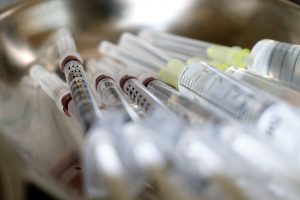In recent months, the term “vaccine diplomacy” has become a popular buzzword used in the media to describe India’s, Russia’s, and in particular, China’s global COVID-19 vaccine rollout. But its usage requires examination. After all, buzzwords do not exist in a vacuum and have the ability to shape national and foreign policies.
There are at least five reasons to be skeptical of its usage.
First, “China’s vaccine diplomacy” can be seen as an extension of the Chinese “debt-trap diplomacy” theory that became a cornerstone of the Trump administration’s Africa policy – despite being disproven – to deter African states from cooperating with China. The term “China’s vaccine diplomacy” implicitly raises questions about the efficacy of China’s vaccines by encouraging the notion that the rollout is simply a strategy to boost China’s global influence.
However, the World Health Organization has cautioned people against comparing COVID-19 vaccine trial results and efficacy because each trial is conducted differently and the vaccines themselves are effective against different strains and stages of the virus. For instance, while China’s Sinovac had disappointing results in Brazil, AstraZeneca’s and Oxford University’s vaccine could not effectively protect against the newer B1.351strain of COVID-19 that became prevalent in South Africa.
Second, the phrase “China’s vaccine diplomacy” implies that China’s vaccine campaign in Africa is opportunistic. This overlooks China’s long-standing support of African public health systems. Interestingly, China and the United States previously engaged together in some form of “vaccine diplomacy” when the two countries aligned their humanitarian responses against the 2014-15 Ebola outbreak in West Africa and China developed MIL-77, an Ebola vaccine based on the American-made ZMapp patent. This was China’s largest pre-COVID-19 humanitarian response abroad. Although it clearly signaled that China was becoming increasingly active in global health, vaccine diplomacy was not mentioned because the United States was not threatened by China’s role in Africa and the global system at the time, and was more interested in collaboration.
Third and relatedly, the concept of vaccine diplomacy has a long history and once signified collaboration and cooperation. It can be traced back to 1798 when the British physician, Edward Jenner, developed the cowpox vaccine and was sent to France during the Napoleonic wars to conduct diplomatic functions including prisoner releases. During the Cold War era, vaccine development was a still key area of collaboration between the United States and the USSR and resulted in the smallpox vaccine and a joint global smallpox eradication campaign. That said, while health has become an increasingly transborder issue requiring global cooperation, and the linkages between global health and foreign policy strengthened, it is only the broader and somewhat more “positive” concept of global health diplomacy that has proliferated more recently, until now.
Fourth, it is also notable that the term “vaccine diplomacy” is used in the context of the fact that – facing significant domestic COVID-19 battles – traditional donor countries have to date not offered significant bilateral support for developing countries during the pandemic. Even COVAX, the COVID-19 global vaccine access mechanism, which was created as early as April 2020, has not met its funding target of $6.8 billion by 2021. Given these deficiencies, using the phrase “China’s vaccine diplomacy” can work as a subtle reminder of traditional donor’s superiority and previous support for global health, even if not forthcoming (at least only slowly as yet). The implication is that China’s vaccine donations cannot be lumped in with the “normal” activities of traditional donors.
Fifth and most importantly, the use of the term “vaccine diplomacy” is a distraction. It shifts focus away from what should be the ultimate area of global cooperation – investing in Africa’s pharmaceutical manufacturing sectors to boost vaccine production within the continent. As the Executive Secretary of the U.N. Economic Commission for Africa Dr. Vera Songwe and many other African leaders have noted, imports account for around 80 percent of pharmaceutical and medical products on the continent, which makes African countries highly externally dependent and situations like poor access to COVID-19 vaccines more likely.
At the time of writing, despite African governments ordering over a billion doses of the COVID-19 vaccine, the doses they have received to date will only cover 0.6 percent of Africa’s population. On the other hand, 34 African states already have some level of pharmaceutical production and Egypt, Morocco, and South Africa are in the process of signing deals to manufacture COVID-19 vaccines. Many African countries want to develop their pharmaceutical sectors – not just get handouts. Doing so will also induce positive spillover effects such as creating jobs and facilitating technology transfer.
China is a key partner for Africa’s pharmaceutical sectors, alongside others such as India. As well as already shifting its surplus manufacturing capabilities abroad, China wants to become a lead player in the global pharmaceutical market within 10 years. Making Africa a key area of relocation for pharmaceutical production, while speeding up and initiating more deals to manufacture COVID-19 vaccines in African countries that have pharmaceutical production capabilities must be a top priority. Indeed, this applies not just to China, but for all donor countries.
The term “vaccine diplomacy” has its limitations and problems. But as history has shown, states can engage in vaccine diplomacy not only to increase their influence but also to strengthen diplomatic relationships and share resources to develop global public goods. The re-emergence of the term “vaccine diplomacy,” and this time on a global scale, needs to be used cautiously as an opportunity for a new, African-centered framework for its role in foreign policy.
Rosie Wigmore is a research analyst at Development Reimagined, an African-led international development consultancy with headquarters in Beijing, China. Wigmore specializes in global health issues.

































